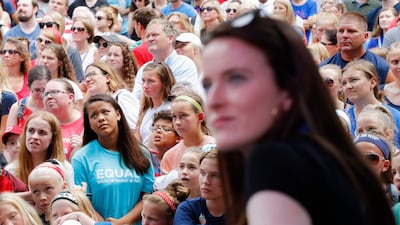In 1966, American singer-songwriter James Brown released one of his biggest hits, It's a Man's Man's Man's World. And when it came to finances, this idea was particularly true. He even made a point of writing "Man makes money to buy from other man".
It is hard to imagine that when the song was released more than 50 years ago, a woman could not hold a bank account or mortgage without a man's signature – even in countries such as the US and UK. In fact, there was no such thing as a woman’s financial independence. A man was always required. And that’s no kind of independence at all.
Half a century on, things are changing. But globally, women still need to focus on their financial lives in order to achieve the security and freedom that money promises. Whether they are rich or poor, and at every stage in their lives, women face a financial penalty. Just because a woman lives a comparatively comfortable life in a comparatively wealthy country, it does not mean she has secured her financial well-being.
According to Princess Reema Bint Bandar Al Saud, self-sufficiency is a "solvable" problem. Speaking to the Rockefeller Foundation this month, the Saudi Ambassador to the US explained that it is a low-tech problem that requires a low-tech solution – but one that must have a lasting impact.
“I truly believe that liberty for a woman comes from the ability to make financial decisions for her life,” she said.
Globally, women are less likely than men to have bank accounts. According to a 2018 World Bank report, the gender gap stood at nine per cent, despite an extra 1.2 billion people joining the financial system over a period of seven years prior to that report.
This gender gap is persistent across every stage of a woman’s financial life. Moneybox, a finance app available in the UK, states that seven out of 10 millennial women admit they have never been taught to manage money – compared to 42 per cent of men. A study by UBS investment bank indicates that 58 per cent of women globally leave long-term financial decision-making to men. It is worth noting that this rises to 69 per cent among the UK's millennial women, which suggests that women – whether in developing or developed economies – need to take more control over their money.
Some women are forced to live in extremely vulnerable situations, simply because they do not have the freedom to leave. Women are also too often burdened by men’s debt and, owing to structural issues in the financial industry, have to spend more time paying back their own debt.
Women’s finances are affected by a variety of factors such as later marriage; rising rates of divorce, especially in later life; women holding greater responsibility for financially maintaining children; the often pressing need to have a two-income household; and rising life expectancy, especially for women.
As a result, women today are in less control of their finances than men. Studies show this is a matter of nurture rather than nature, and the prevalence of social structures that are rigged against them.
Financial independence is naturally linked to the ability to get a job with fair and equal pay. It is also affected by pregnancy, childcare and the disproportionate burden of household and elderly care on women.
It quickly becomes clear that this is a matter of collective urgency that women themselves need to take ownership of. Women recognise this.
Recently, Bayt.com published a survey titled 'Working Women in the Middle East and North Africa'. Of the 600 women polled, 57 per cent said that they want to work in order to achieve financial independence.
Becoming financially liberated is about more than just having a job. It is about understanding how our financial lives work and being in control of them.
So, while talking about financial management might sound dull, we have to remember that for all of us – especially women who globally still do not have control over their own finances – money provides security and freedom to manage one's own life, and there is nothing more exciting than that.
Shelina Janmohamed is the author of Love in a Headscarf and Generation M: Young Muslims Changing the World

